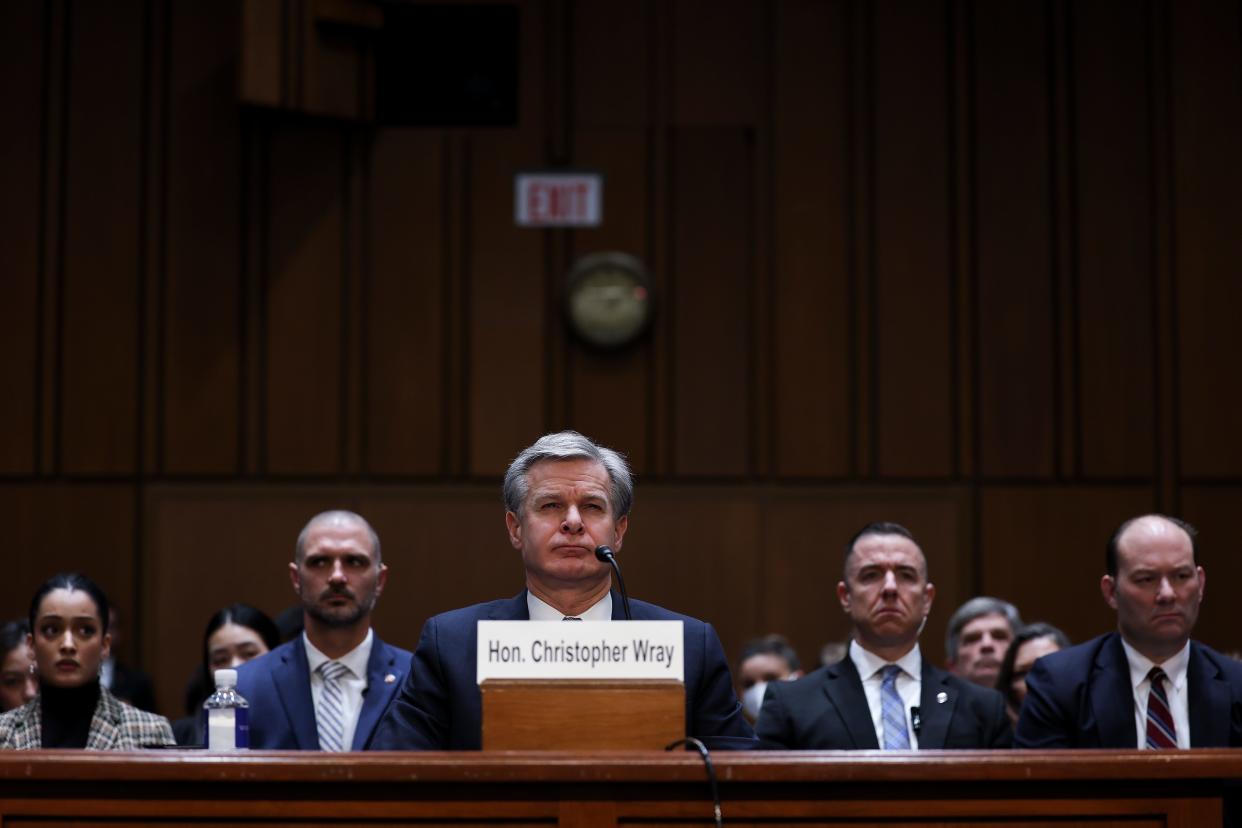FBI data shows America is seeing a 'considerable' drop in crime. Trump says the opposite.
Jeff Asher is a New Orleans-based crime data analyst who has worked at the CIA and Department of Defense. He leans towards caution when describing trends in his line of work.
Amid the heated crime rhetoric that is a staple of politics and is continuing this year – former President Donald Trump and his conservative allies in Congress and the media are using dire terms to describe crime trends in America – Asher has been carefully sifting through the data.
The story he tells has been slow to emerge but stands in stark contrast to Trump's narrative.
As early data showed murders declining nationwide last year, Asher was careful about overstating things. But as the big decline continued, he wrote in December that he had “seen enough” and was ready to declare that the U.S. was experiencing a major drop in killings.
“Murder plummeted in the United States in 2023, likely at one of the fastest rates of decline ever recorded,” Asher wrote online.
The decrease in murders is "potentially historically large," Asher told USA TODAY, and it's not just killings that are declining. Preliminary 2023 FBI data “paint the picture" of a big decrease in overall crime, he wrote.
That’s not the picture Trump and his supporters are painting on the campaign trail, with voters likely to hear plenty more in the coming months that attempts to cast President Joe Biden as weak on crime. A House Judiciary Committee field hearing scheduled for Friday in Philadelphia is expected to focus on the topic, picking up on a theme the GOP-led panel covered during similar sessions last year in New York and Chicago.
Trump’s crime rhetoric has been escalating as he faces his own criminal jeopardy, with the former president arguing that prosecutors are ignoring the real crime problem in America to pursue a political “witch hunt” against him.
He complained last summer about the "filth and the decay" in Washington, D.C. as he headed back to the nation's capital for his arraignment on federal criminal charges tied to the Jan. 6, 2021, riot at the U.S. Capitol. Campaigning in Georgia last month, where he's fighting additional state-based criminal charges, Trump declared that “crime is rampant and out of control like never, ever before.”
Yet even as the data contradicts Trump’s description of a nation in the grip of terrible crime wave, many Americans are inclined to agree with him, polls show, and crime could be a key issue this election cycle.

Trump is making public safety concerns, particularly crimes committed by undocumented immigrants, a centerpiece of his 2024 campaign. His message is targeted at swing voters who might have qualms about Trump and GOP policies on issues such as abortion but could find a tough-on-crime pitch appealing.
"The suburban housewives actually like Donald Trump. You know why? Because I'm the one who's gonna keep them safe,” Trump said recently, referencing a voting block that could swing the election.
The Trump campaign referred questions about Trump's rhetoric conflicting with FBI data to the Republican National Committee, which pointed to articles raising questions about the accuracy of the FBI data and conflicting information in federal reports.
RNC spokeswoman Anna Kelly said USA TODAY was "trying to gaslight Americans into believing that their lived experiences are wrong" and noted "families are rightfully concerned" about crime.
"Biden’s weakness has made Americans less safe, and his policies have failed," Kelly added.
Aggressive crime rhetoric has been a staple of GOP politics going back decades, but Trump’s comments clash with the reality laid out in FBI and other reports of a nation mending after a troubled period.
Pandemic crime wave
Republicans also ran on tackling crime during the 2022 midterm election cycle, and they had data to back up their claims that it was a growing problem.
The United States experienced a spike in violent crimes that coincided with the pandemic and social unrest surrounding police killings of George Floyd and other unarmed African American individuals.
The FBI reported that violent crimes increased an estimated 5.6% in 2020 and remained at that elevated level in 2021, dipping by just 1%.
The 29% estimated increase in murders in 2020 was particularly shocking, and murders jumped another 4.3% in 2021 estimates.
While the increase was alarming, crime was still well below levels seen a few decades ago, said Jeffrey Butts, a professor at the John Jay College of Criminal Justice and director of the school’s Research and Evaluation Center.
“When COVID hit we saw this spike, so from 2020 to 2022 it was bad but… it still came nowhere near where we were in the 1990s,” Butts said, noting crime soon began to drop again as expected.
Researchers believe the crime increase was a blip caused by pandemic disruptions, Butts said.

'Horrible things are happening'
Regardless, Republican leaders accused Biden and Democrats of triggering an “onslaught of violent crime that is ravaging our communities,” as GOP Reps. Steve Scalise and Scott Fitzgerald wrote in a Fox News column. They blamed "defund the police" rhetoric – which Biden rejected – and criminal justice reform efforts on the left, such as ending cash bail.
“House Republicans are ready to stand up to the criminals who think that this country is theirs for the taking, and the leftists in Washington who are enabling this outbreak of violent crime,” the lawmakers wrote.
Trump has continued that type of rhetoric, even as crime as ebbed.
The FBI’s national crime estimates for 2022 found that violent crime decreased 1.7% and there were 6.7% fewer murders. Complete FBI crime data for 2023 won’t be released until the fall, but quarterly reports show violent crime continuing to drop.
University of New Haven criminal justice Professor Maria Tcherni-Buzzeo said the downward trend in crime means "we are kind of returning to where we were before the pandemic."
Asher cited preliminary 2023 FBI data in predicting that the final numbers for the year could show a "considerable" drop. The third quarter FBI data showed murders dropping an estimated 15.6% compared with the same period in 2022 and violent crime dropping 8.2% overall.
The fourth quarter 2023 report released in March show an estimated 4% drop in property crime, 6% drop in violent crime and 13% decrease in murders from 2022. The fourth quarter report covers the entire 2023 calendar year, and can be considered a preliminary year-end report.
Questions about crime data
The FBI relies on voluntary reporting from police agencies to develop national crime statistics. Some police departments don't report their data, so the agency estimates crime levels in those regions to come up with a national number.

The FBI transitioned to a new system in 2021, causing problems for some police departments and a drop in agencies reporting their data. The agency had to lean more on estimates, and that has led to questions about the accuracy and completeness of the information.
The percentage of police departments reporting their data has been increasing since then, but the information is still incomplete – 79% of agencies reported in the fourth quarter of 2023 – and the agency uses methods to adjust for missing data and publish estimates.
While FBI data showed violent crime decreasing in 2022, another widely-cited crime barometer showed a different picture. The 2022 National Victimization Survey conducted by the Bureau of Justice Statistics, which captures both reported and unreported crimes, found a steep increase in the violent victimization rate.
That survey measures a different timespan, though, starting with crimes that occurred in July of 2021 when pandemic disruptions were more acute and continuing through November of 2022. The 2023 survey won't be released until the fall, and there aren't interim reports like the FBI data.
Because of the different timeframes and other factors, Asher believes the victimization survey and FBI reports shouldn't be compared. He and other crime statistics experts say they are confident in the overall trend laid out in the FBI data of crime decreasing. The data have a margin of error because they rely on estimates, but clearly point in the direction of reduced crime.
“The trends are clear, there’s no questioning the trend in good faith in my opinion," Asher said.
Some communities continue to experience elevated crime levels, or increases in certain crimes. Murders are up 9% in Los Angeles, 8% in St. Louis and 23% in Denver this year compared to the start of 2023, according to data compiled by Asher's firm, AH Datalytics. Nationwide, 2023 third and fourth quarter FBI crime reports show motor vehicles thefts increasing.
Overall, though, crime is going down and is at or near pre-pandemic levels, according to the FBI data, experts interviewed by USA TODAY and other leading groups that study the issue.
"Crime rates are largely returning to pre-COVID levels as the nation distances itself from the height of the pandemic, but there are notable exceptions," the non-partisan Council on Criminal Justice wrote in a year-end 2023 analysis of crime trends in 38 cities.
That trend is continuing into 2024.
Big drop in murders
There are 532 fewer murders so far this year in the 218 cities tracked by AH Datalytics, when compared with the same period last year, a 20% decline.
“I would have no problem walking around any big city in the United States right now,” said University of Miami criminologist Alex Piquero, who previously ran the federal Bureau of Justice Statistics, which publishes crime data. “The issue that we have is people are diving into social media and they’re not taking the time to digest really what’s happening.”
Piquero said people can "cherry pick" a few cities or crime types to argue crime still is a growing problem, but the national picture shows a steady decrease.
"There’s no doubt in my mind that 2022 was better than 2021, 2023 is going to be better than 2022 and 2024 will be better than 2023, I think every single data point we’re seeing is showing that," Piquero said.
Trump often focuses on crime in a few cities.
Murders are down 18% in New York City and 24% in Washington D.C. so far in 2024, according to police data, yet Trump continues to portray both cities as crime infested.
At his Georgia rally, Trump said businesses are going to leave New York “over crime” and described Washington D.C. as “a nightmare of murder and crime.”
“People from Georgia go down to Washington now and they get shot,” Trump said. “Horrible things are happening.”
Washington D.C. had 274 murders in 2023, the most since 1997, and up from 166 in 2019. So even if the 24% decrease holds for the entire year, the city would still be above the pre-pandemic murder level.
Yet the city's crime problem appears to be ebbing this year, with violent crimes down 25% and property crime down 13% so far when compared with the same period in 2023, according to the D.C. police department.

Politics of crime
Trump’s crime rhetoric continued as his trial kicked off earlier this month in New York City on charges stemming from alleged hush money payments to an adult film star to hide an affair.
After the first day of jury selection, Trump emerged from the courtroom and attacked Manhattan District Attorney Alvin Bragg.
“You go right outside and people are being mugged and killed all day long and he’s sitting here all day with about 10 or 12 prosecutors over nothing," the former president said.
Trump later visited a New York City bodega where a man was stabbed to death to further argue that the city has a crime problem. Earlier this month he held an event in Michigan with law enforcement to highlight crimes committed by undocumented immigrants, seizing on the case of Ruby Garcia, who was killed by her undocumented partner.
Garcia’s sister rebuked Trump for claiming he spoke with the slain woman’s family, which she said is not true.
The downward crime trend could hurt Trump’s efforts to deflect attention away from his own criminal cases by claiming there are bigger crime concerns. But polls show many Americans aren’t convinced crime is down.
A Gallup survey released in November found that 77% of Americans believe there is more crime than a year ago, despite FBI data showing the contrary.
The survey also found that more people say crime is an extremely or very serious problem now than in 2021, when murders actually increased.
That’s despite the fact that only 17% of people say crime is a big problem where they live.
That may be a sign that people’s opinions are driven more by political and media narratives around crime in faraway places than by the data.
Tcherni-Buzzeo said that “it may seem that… Trump makes people feel like crime is up,” but in her experience the mistaken belief that crime is increasing predates the former president’s political campaigns.
Going back more than a decade, whenever she asked students if crime is on the rise, the majority of the class would say yes, even though crime generally has been trending down since the 1990s.
Such beliefs may be “fueled by the fact this is what they see on the news,” she said.
The reality with violent crime is that “the trend is positive” recently and that should be the baseline for policy debates, Asher said.
“That does not endorse the level (of crime), it doesn’t mean there’s not work to do,” he said, adding: “But we don’t argue about whether the Chiefs won the Super Bowl.”
This article originally appeared on USA TODAY: FBI crime data shows decrease, despite Trump's contrary claims
